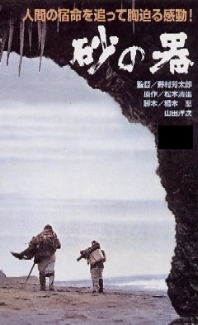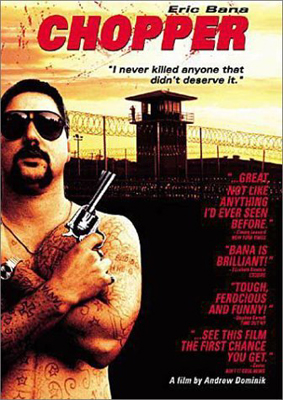The Adventure of Sherlock Holmes' Smarter Brother (Gene Wilder, 1975)
- 
I'll be the first to admit that this should probably be a
, but there's just something charming and nostalgic for me, and it's got a wonderful cast. Madeline Kahn is a joy and looks lovelier here than probably in any other movie, and she works well with Wilder who has fun trying to work up to the level of his famous detective brother. When you add Marty Feldman, Dom DeLuise and Leo McKern, you can't help but laugh quite a few times even if the film is slightly-underdeveloped. Probably the weakest point to me is that there are enough songs here (Kahn plays a singer-actress after all) to call it a musical, and some of the "straight" ones in the theatre are good, but there are a bit too many "cute" songs thrown in to the mix where characters just burst into song. Even so, it's one of my faves in this tab.
Castle of Sand (Yoshitaro Nimura, 1974)
; Art House Rating:

Let me
slowly jump to the chase here and try to explain the difference between my two ratings. This film is considered worthy to be discussed along with Kurosawa's best. The reason for this, I imagine, is that it's something of an epic (143 minutes and covers about 35 years of time). It also is a film which starts out one way and then transforms itself into something resembling a completely-different kind of more-significant movie than you thought, and it utilizes extremely unique-and-personal music to tell its tale. I have to admit that although I vaguely remember the title, I really knew nothing at all about this film before I saw it. So I watched a Japanese police procedural/murder mystery, which I felt utilized an extremely-awkward storytelling style (hiding info, almost to a mystifying degree) and had two detectives who consisted of one who's a been-there/done-that-type of veteran and a youngster with tons of energy and lots of natural inquisitiveness. This accurately describes their personalities, and reading that, it makes them seem more interesting than they are. Anyway, the only reason we care (if we do) about these guys is because through some primitive CSI techniques, we learn something to do with a murder, and this somehow leads us to a pianist/composer and a leper. From here on, the film completely evolves into something resembling a commentary on a cultural social injustice, but equally important, it also seems to be this live concert given full of newly-composed orchestral music which comments on all the film's visuals (something along the lines of a score for a silent movie).
I'm apparently supposed to be overwhelmed emotionally, and I'll admit that the score is beautiful, but the film begins so awkwardly, and I also believe that it continues that same way while audaciously transitioning to a completely-different animal. Instead of feeling deep emotions about how the film turned out, I'm unfortunately wondering why it took so long (all the cop stuff is borderline amateurish to me, at least on a technical level) for me to feel like I didn't quite "get" the murder mystery part. I watched this because it was on the Noir List, and I may well rewatch this soon to decide if I have the problem, but at least I can understand how to rate movies in two different ways. Tell me which rating you agree with.
The Trip (Roger Corman, 1967)

Psychedelic flick, scripted by Jack Nicholson, which stars future
Easy Rider compadres Peter Fonda and Dennis Hopper. What passes for a plot involves Fonda in an early "mid-life crisis" who decides to allow LSD guru Bruce Dern "guide" him through his first acid trip. The acid is provided by Hopper. Most of the film is something resembling the acid trips later seen in
Easy Rider and
Midnight Cowboy, although they last far longer here and involve things which are far-more surrealistic. What makes the film watchable is the cast and the fact that Corman went so overboard with the LSD effects that you cannot look away because you'll miss something completely crazy which would be impossible to predict. I'll admit that a little of your "basic" acid trip goes a long way, but when you make a movie with an on-screen 45-minute acid trip, this is the way to do it because even if you don't especially like it, you'll certainly remember parts of it.
Henry Poole is Here (Mark Pellington, 2008)

This is a likable movie and Luke Wilson is a likable lead character, but although it seems like it's got an interesting plot, the whole thing is just a little too-lowkey for its own good. Wilson moves into a fixer-upper home in Los Angeles, and immediately he's confronted by a nosy neighbor (Adriana Barraza) who claims a stucco stain on his wall is the face of Jesus Christ. For reasons which later become clear, Henry just wants to be left alone, but the neighbor persists and before long, his home becomes something resembling a holy shrine and he's accused of being an atheist. Henry's only ally in this scenario is another neighbor (Radha Mitchell) who's the one person to whom he can reveal his feelings about this media circus and his current situation. As the film progresses, there are numerous plot twists which may well change the way that different people see the entire situation. As I said, likable it is, so I guess it all depends on
how much YOU LIKE it.
Chopper (Andrew Dominik, 2000)
; Cult Rating:

I prefer this to Dominik's next film,
The Assassination of Jesse James by the Coward Robert Ford, which is just as stylistically-alive but is an hour longer and has characters who seem to be acting using a script which was translated by someone who doesn't understand English. I know, nowadays that rates a "Brilliant!", but although I do not find
Chopper to be brilliant, it's so far more intense and cinematic, with just as flamboyant a color and lighting scheme and a very strong lead performance by Eric Bana as the man who's able to kill people and get away with it, even though he's basically spending his life behind bars in Australia. The main problem I have with
Chopper is that the beginning is too-intentionally confusing. However, it's definitely a film which gets better as it goes along, both cinematically and in the way it reveals the character of this murderer who's proud of his deeds and even writes a best seller in prison while basically remaining illiterate, although that part was a bit of a stretch because Bana comes across as just as intelligent as he is animalistically-brutal.
The Shooting (Monte Hellman, 1967)
; Cult Rating:

Monte Hellman is a cult director and this is the second (and better) western he made in the mid '60s with Jack Nicholson and Millie Perkins (the other being 1965's
Ride in the Whirlwind). This one looks better and, although just as enigmatic as the earlier film, it actually seems to have a reason for being, even if the ending will still evoke plenty of shaking heads trying to figure out EXACTLY what happens and why. Warren Oates is excellent as usual, and the plot, such as it is, actually plays out as an existential chess game, but the problem is not only that I'm not sure who won, but I'm pretty sure that I still don't care. Maybe even another rewatch will help sort it all out. Scripter Carole Eastman did later write
Five Easy Pieces, but this is basically a good way to introduce yourself to Monte Hellman if you've never seen any of his films. Just be sure that you don't get lulled to sleep; it seems that most of the time nothing is happening, so pay attention to what does HAPPEN and what is SAID because those are the only clues you're going to get.
Burnt Offerings (Dan Curtis, 1976)

Dan Curtis is known as the creator and director of two cult TV shows,
"Dark Shadows" and
"The Night Stalker", but he never really made any other "major" theatrical films after this one. (He made two
Dark Shadows films which were released earlier to the big screen.) This film was based on a novel which came out in the wake of
The Exorcist and was released just after
The Omen. Compared to those classics, it pales, but as a minor horror thriller, it really isn't all that bad even if it takes its sweet time in developing and ends up sorta forshadowing the ending of Kubrick's
The Shining. It's all about a family (Oliver Reed, Karen Black, Bette Davis and Lee Montgomery) who move into a remote old house basically to take care of the unseen mother of two elderly siblings (Burgess Meredith and Eileen Heckart). Since the rental price is too cheap to be true, there has to be a catch, and yes, we all slowly learn what that catch is. Although there are no real big scares, there are a few scenes near the end which are just so original (whether you think they're scary, weird or just campy), that they add a bit of extra entertainment to the proceedings.
The Wackness (Jonathan Levine, 2008)

This is another film which seems like I should like it better, but for some reason, for every witty or poignant line or scene, I find one which is totally-predictable. It's set in the Summer of 1994, and Ben Kingsley is good at playing aging hippie psychiatrist "Dr. Jeffrey" who would like to relive his youth, and he finds someone he can attempt to do that with in the person of the recent high school graduate (and NYC's primo bud dealer) Luke (Josh Peck). In fact, Luke pays for his therapy (such as it is) with dope. Luke isn't terribly happy about his prospects, but he is interested in Dr. Jerry's daughter-in-law Stephanie (Olivia Thirlby), and since he's ("not-officially") a virgin, he takes Jerry's advice on first love/romance with young women in general without ever telling him about Stephanie in particular. Things happen, and while entertaining, it never gets to the point (for me) where it gets to a higher, truer level. For example, I was a high school teacher in 1994, and this version of 1994 seems a little bit unrealistic in the use of certain phrases, technology and significant pop culture references, although it does try. Then again, maybe I
still have Alzheimer's. (D'Oh!)













